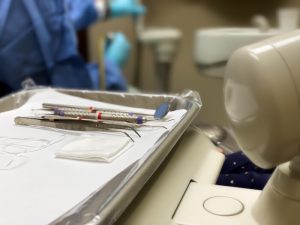West Virginia can do More to Improve Access to Dental Care
Oral health care has been historically undervalued in the U.S. health care system, including West Virginia–dare I say especially in The Mountain State?
I was one of the lucky ones. My mother saw to it that I visited our family dentist on a regular basis. I still remember the pencil topper erasers I was so excited to pick out after my cleanings. My favorite was a white headed German Shepherd. I seem to recall a pig head eraser too.
I continued this tradition with my daughter. Unfortunately access is not that easy for every West Virginia resident.
We know so much more now. People who don’t have good oral health habits and access to regular and quality dental care elevate their risk of other critical health care issues, such as heart disease, cancer, and diabetes. I must admit, I was in my thirties before I understood the relationship between oral health and my overall physical health.
More than aesthetics or stereotypes, access to dental care is a dangerous culture divide that might look like a class gap but is deeper and far more serious.
A new CareQuest Institute for Oral Health report shows that poorer families paid 7.4 times more in out-of-pocket expenditures for dental care compared to high-income families between 2007 and 2021. At the same time, families living in poverty and those with lower incomes were less likely to have visited a dentist in the past year compared to families with higher incomes in the US.
These findings indicate that solutions are still needed to make dental coverage and care more accessible and affordable for low-income families. This includes addressing gaps in dental insurance coverage, particularly through Medicaid. As one example, if all states provided comprehensive Medicaid adult dental benefits — this income-based inequity in dental care spending would be mitigated.
If a state’s priorities are reflected in its policies, then it would appear that for years dental coverage has not been a priority in the Mountain State, but there has been some progress.
Previously, adult Medicaid beneficiaries in West Virginia had emergency-only coverage, but in 2021, West Virginia created a limited Medicaid adult dental benefit that provides up to $1,000 per year and includes diagnostic, preventive, restorative services, and prosthodontic (denture) services. These new benefits have allowed thousands of our friends and neighbors to access needed care – many for the first time in years.
On July 1, 2024, the state’s cap on Medicaid dental coverage increased from $1,000 per year to $2,000 over two years to allow Medicaid recipients to get both sets of dentures at the same time at a cost of about $600 each. This is progress!
According to Gina Sharps, West Virginia Oral Health Coalition executive director, numerous studies show that Medicaid adult dental coverage lowers overall health care spending on chronic disease management and emergency department usage. Emergency department visits alone cost an estimated $2.1 billion per year, and research indicates that nearly 79% of these visits could be addressed in a dental office — a potential savings of up to $1.7 billion per year. It also boosts oral health outcomes for patients and increases employment opportunities.
Efforts must also be made to increase dental provider participation in Medicaid and support the safety-net providers primarily serving low-income patients.
According to the latest report by the West Virginia Oral Health Coalition, West Virginia earned a failing grade for its small dental workforce with about 49 dentists per 100,000 residents, compared to the national average of 61 per 100,000. That translates to about only 6 dentists in each of West Virginia’s 55 counties. In addition to the small dental workforce, only 28.5% of dentists accept Medicaid patients, a quarter of all dental practices in West Virginia are not accepting new patients, and people in the state wait on average 70 days for their first dental care appointment.
Adults and children who self-pay face a wait time of up to 73.2 days, and children on Medicaid wait up to 58 days.
Incentivizing oral health providers to practice in Dental Health Professional Shortage Areas can also help improve access to affordable oral health care in these geographies. While some policy progress has been made in recent years, more still needs to be done to fully address these inequities.
There is a big difference between dental coverage for emergencies only and a benefits package that includes a full spectrum of preventive and restorative dental care with no annual maximum. And those differences can be felt in ways that last a lifetime.
Good oral health not only enables you to functionally perform as a human being – like speaking, smiling and eating – it is also important for communication, human relationships and financial prosperity. Poor dental health carries serious consequences that can lead to systemic and costly health conditions, such as oral health cancer and even heart disease.
This is especially the case for those who have the biggest obstacle in getting access to dental care – rural and lower income households.
Many of the determinants that impact our oral health, such as diet and hygiene are controllable with the right habits. However, without health choices and habits, plaque buildup eventually leads to cavities, gingivitis or severe gum disease that puts teeth and gums at risk – and even other parts of your body.
While we continue educating our family, friends, neighbors, and colleagues about the new oral health benefits so many have worked so hard to put in place, let’s get to work expanding the number of sites that provide care by working with our community-based and private practice dental care providers to encourage their participation in Medicaid and by putting processes in place to make it easier for providers to participate.
It is time to prioritize oral health and provide whole-person health care for every West Virginian.

